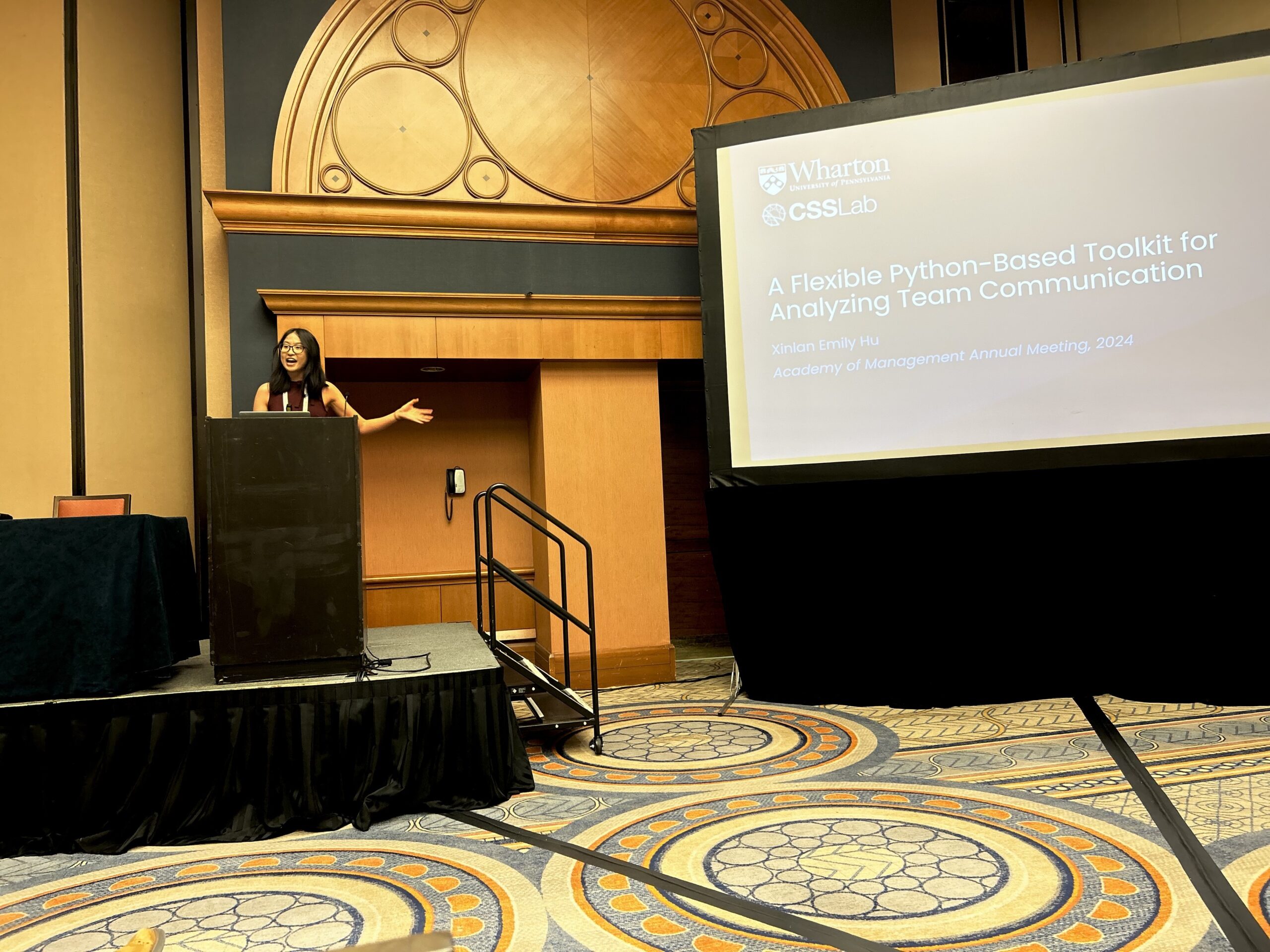
Emily Hu, a fourth year Wharton Operations, Information, and Decisions PhD student at the Computational Social Science Lab (CSSLab), has just launched her award-winning Team Communication Toolkit at the Academy of Management Conference on August 12 in Chicago. This toolkit allows researchers to analyze text-based communication data among groups and teams by providing over a hundred research-backed conversational features, eliminating the need to compute these features from scratch.
In the social sciences, communication is explored in a “variety of contexts, as it is a fundamental form of interaction and useful for studying team dynamics.” Researchers who study conversations typically need to represent attributes of a conversation in terms of quantitative features they can analyze. These features include “how much was said, similarities between speakers, variance in opinions of speakers or how much a conversation changes over time within a team,” says Emily. Being able to identify meaningful attributes in conversations is essential, as it helps us understand the factors that influence our interactions in a variety of contexts–whether it’s team dynamics, conversations, or negotiations.
But the process of identifying and extracting conversation features can be time consuming: researchers must first determine which features of the conversation they want to explore, and then develop the software (tools) to measure these features, often from scratch. Additionally, when building their own features, researchers can run into the problem of the “garden of forking paths,” in which different possible decisions in designing the feature can lead to different analytical results; consequently, it is difficult to determine the most accurate method of quantifying features or to compare results across methods.
This garden of forking paths problem motivated Emily to build the Team Communication Toolkit, an open-sourced Python package for generating conversation features from text data. Realizing the complexities of analyzing conversations, Emily set out to build a platform to help promote a collective understanding of communication. Her team has spent the last two years reviewing the literature on these conversational features and implementing 164 of them (and counting!) into the toolkit. A few of the available features are shown in the figure below.

To access the toolkit, simply download the Python package (PyPi) and input your data and required parameters into the “FeatureBuilder” module — this will prompt the toolkit to generate the conversational features, and you’ll receive all of your results in a CSV file for easier interpretation of the data. The latest documentation on the toolkit can be found here.
To help researchers study conversation attributes at different levels of analysis, the Team Communication Toolkit generates results at three levels: the utterance, the speaker, and the conversation. Each of these levels may be relevant depending on the needs of the study. Utterance-level features look at individual messages in a conversation, such as comparing if one message is more positive than another. Speaker level-features compare one speaker to another, for instance, evaluating whether one speaker is more talkative than the other. Lastly, conversation-level features apply to a whole conversation, and allows for comparisons including whether a conversation is longer than another.

Emily hopes that this toolkit will greatly benefit the social science community by reducing the cost of extracting features from conversational data. Now researchers will have access to more than a hundred features right at their fingertips, allowing them to conduct analyses more efficiently, as well as test the robustness of their study’s findings across different methods of extracting features. For researchers building new feature extraction methods, she also hopes that the toolkit can serve as a platform for distributing these methods for others to access, as a “living database” of the community’s latest work.
Though researchers have been interested in conversation for decades (since the 70’s), the Team Communication Toolkit aims to make it possible for researchers to explore more fine-grained questions using advanced computational methods. With all the conversational features conveniently in one place, researchers can explore a more diverse array of questions across various fields. For example, delving into turn-by-turn dynamics can help researchers study the types of conversational strategies that are most likely to lead to a successful deal in negotiation, or the attributes of leaders’ communication that are most effective at motivating their employees. The ability for code to generate a wide range of features on any kind of data opens a wealth of possibilities across the social sciences.
To learn more about the Team Communication Toolkit, you can visit the project website here: https://teamcommtools.seas.upenn.edu/
The Team Communication Toolkit is supported by the Computational Social Science Lab (CSSLab) and funded by the Wharton AI & Analytics Initiative.
Emily’s project won the 2024 IACM Technology Innovation award for her innovative use of technology in research in the area of negotiation and conflict management.
AUTHORS
Delphine Gardiner

—
Senior Communications Specialist
